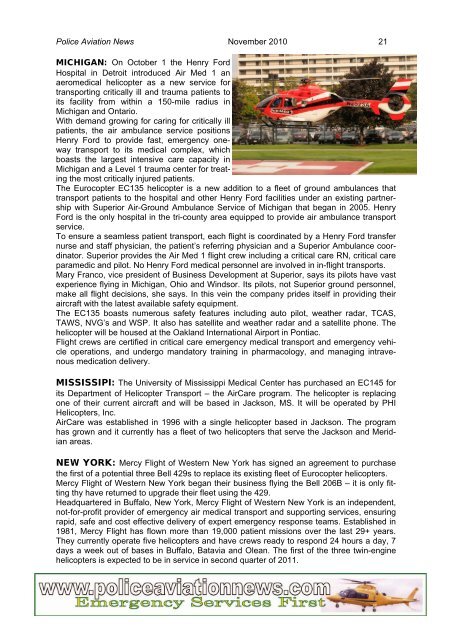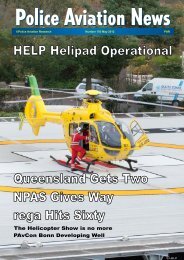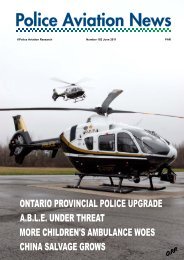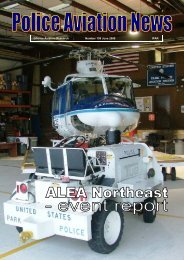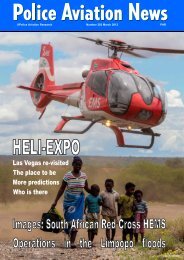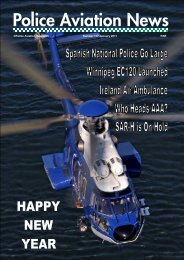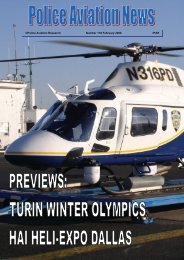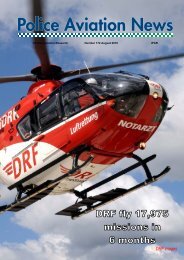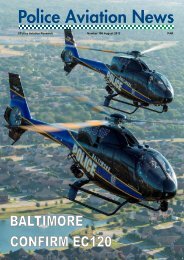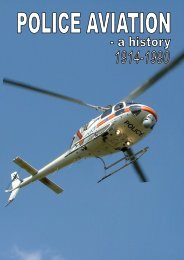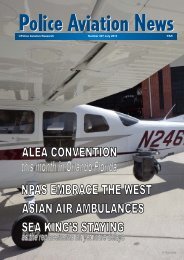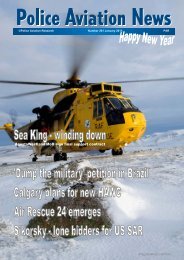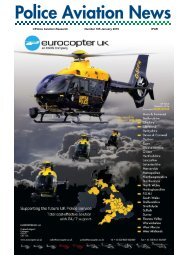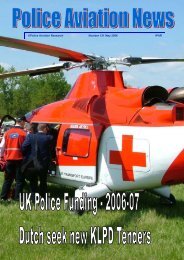Police Aviation News November 2010
Police Aviation News November 2010
Police Aviation News November 2010
Create successful ePaper yourself
Turn your PDF publications into a flip-book with our unique Google optimized e-Paper software.
<strong>Police</strong> <strong>Aviation</strong> <strong>News</strong> <strong>November</strong> <strong>2010</strong> 21<br />
MICHIGAN: On October 1 the Henry Ford<br />
Hospital in Detroit introduced Air Med 1 an<br />
aeromedical helicopter as a new service for<br />
transporting critically ill and trauma patients to<br />
its facility from within a 150-mile radius in<br />
Michigan and Ontario.<br />
With demand growing for caring for critically ill<br />
patients, the air ambulance service positions<br />
Henry Ford to provide fast, emergency oneway<br />
transport to its medical complex, which<br />
boasts the largest intensive care capacity in<br />
Michigan and a Level 1 trauma center for treating<br />
the most critically injured patients.<br />
The Eurocopter EC135 helicopter is a new addition to a fleet of ground ambulances that<br />
transport patients to the hospital and other Henry Ford facilities under an existing partnership<br />
with Superior Air-Ground Ambulance Service of Michigan that began in 2005. Henry<br />
Ford is the only hospital in the tri-county area equipped to provide air ambulance transport<br />
service.<br />
To ensure a seamless patient transport, each flight is coordinated by a Henry Ford transfer<br />
nurse and staff physician, the patient’s referring physician and a Superior Ambulance coordinator.<br />
Superior provides the Air Med 1 flight crew including a critical care RN, critical care<br />
paramedic and pilot. No Henry Ford medical personnel are involved in in-flight transports.<br />
Mary Franco, vice president of Business Development at Superior, says its pilots have vast<br />
experience flying in Michigan, Ohio and Windsor. Its pilots, not Superior ground personnel,<br />
make all flight decisions, she says. In this vein the company prides itself in providing their<br />
aircraft with the latest available safety equipment.<br />
The EC135 boasts numerous safety features including auto pilot, weather radar, TCAS,<br />
TAWS, NVG’s and WSP. It also has satellite and weather radar and a satellite phone. The<br />
helicopter will be housed at the Oakland International Airport in Pontiac.<br />
Flight crews are certified in critical care emergency medical transport and emergency vehicle<br />
operations, and undergo mandatory training in pharmacology, and managing intravenous<br />
medication delivery.<br />
MISSISSIPI: The University of Mississippi Medical Center has purchased an EC145 for<br />
its Department of Helicopter Transport – the AirCare program. The helicopter is replacing<br />
one of their current aircraft and will be based in Jackson, MS. It will be operated by PHI<br />
Helicopters, Inc.<br />
AirCare was established in 1996 with a single helicopter based in Jackson. The program<br />
has grown and it currently has a fleet of two helicopters that serve the Jackson and Meridian<br />
areas.<br />
NEW YORK: Mercy Flight of Western New York has signed an agreement to purchase<br />
the first of a potential three Bell 429s to replace its existing fleet of Eurocopter helicopters.<br />
Mercy Flight of Western New York began their business flying the Bell 206B – it is only fitting<br />
thy have returned to upgrade their fleet using the 429.<br />
Headquartered in Buffalo, New York, Mercy Flight of Western New York is an independent,<br />
not-for-profit provider of emergency air medical transport and supporting services, ensuring<br />
rapid, safe and cost effective delivery of expert emergency response teams. Established in<br />
1981, Mercy Flight has flown more than 19,000 patient missions over the last 29+ years.<br />
They currently operate five helicopters and have crews ready to respond 24 hours a day, 7<br />
days a week out of bases in Buffalo, Batavia and Olean. The first of the three twin-engine<br />
helicopters is expected to be in service in second quarter of 2011.


